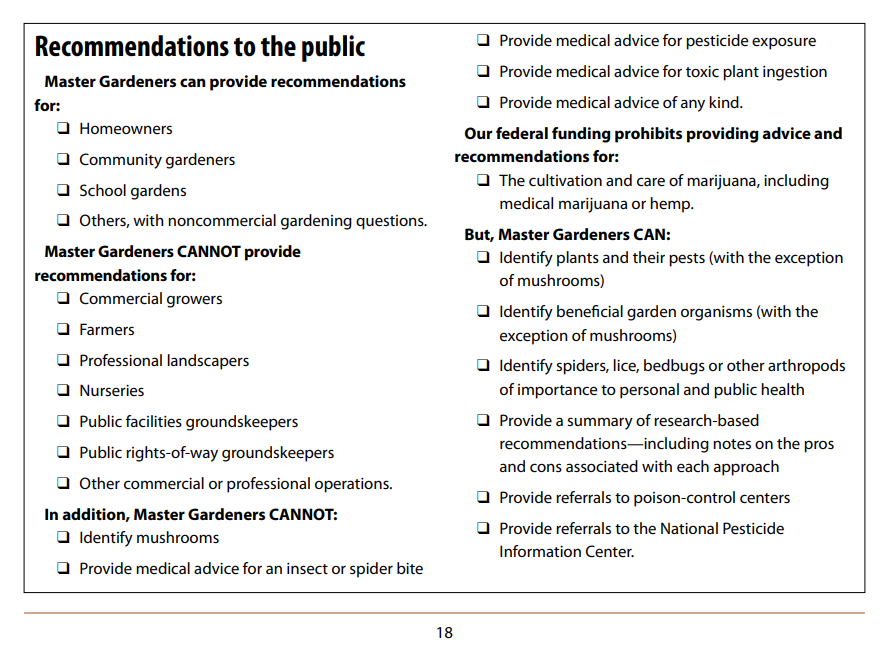March 25, 2020
To: OSU Extension Master Gardener Coordinators, Faculty, and Staff
From: Gail Langellotto, Statewide Master Gardener Program Coordinator
Subject: Guidance on Master Gardener Activities and Plant Care, in the Context of Executive Order 20-12
In response to the COVID-19 outbreak and in accordance with Oregon Gov. Kate Brown’s Executive Order 20-12 (Stay Home. Save Lives), Master Gardener Programs are to continue with the suspension of face-to-face programming. This means no face-to-face Master Gardener classes, events, meetings or outreach activities.
The purpose of the executive order and this guidance is to slow the spread of COVID-19 in Oregon, to protect the health and lives of Oregonians, particularly those at highest risk, and to help avoid overwhelming local and regional healthcare capacity. Oregon State University fully supports the governor’s executive order and encourages its community members to stay at home.
Plant Care in Greenhouses or Gardens
In terms of plant care in greenhouses or gardens (whether they are school, community, or educational gardens), I offer the following guidance:
If the greenhouse and/or garden is on OSU-owned or OSU-leased land:
- Only OSU employees will be allowed access to maintain plant materials or gardens. Limiting on-campus and onsite operations is required under EO 20-09. Volunteers are not to be permitted to access OSU Extension-owned or leased property for any reason, including plant care or garden care.
- A single OSU employee should be identified (as per Anita Azarenko’s March 23rd email noting that ‘regional directors will identify one individual per off campus location to monitor building security, receive mail, and perform other critical functions determined by the university’.
- Maintenance of plant materials or gardens by a designated OSU employee will be performed on an ‘as available’ basis. Employees should only include plant or garden maintenance in their short-term Plan of Work if they have the capacity, ability and willingness to do so.
- Carefully consider whether or not plant care or garden care represents a critical function at this time. Supervisors will help employees to determine what qualifies as a critical function. If plant care or garden care is deemed critical, think of the steps that you can take to minimize plant care or garden care needs. For example, can the greenhouse temperature be lowered to reduce watering needs and slow plant growth? In parts of Western Oregon, many perennials can survive without supplemental water well into June. Note that many common gardening maintenance activities, such as weeding, pruning or plant propagation, are not critical activities.
- Worm bin or compost pile maintenance is not considered a critical function.
If the greenhouse and/or garden is on land that is NOT owned or leased by OSU:
- We must honor the policies in place of our community partners. Many fairgrounds, recreation and parks units, and schools have closed their facilities to the public.
- Individuals should refer to Executive Order 20-12, particularly section 22, which dictates that “individuals are directed to minimize travel, other than essential travel to or from a home, residence or workplace; for obtaining or providing food, shelter, essential consumer needs, education, health care, or emergency services . . .”
- Under the current directives of Executive Order 20-12, Master Gardener volunteers are not authorized to care for greenhouse plants or gardens on behalf of OSU or in their role as a Master Gardener volunteer.
Donating or Selling Plants
Many of you have asked about the possibility of selling or donating plants that were originally destined to be sold at Master Gardener Association plant sales.
For plant materials that are owned by Master Gardener Chapters or Associations and not by OSU:
- We are exploring whether or not the plants can be sold or donated to partner agencies, while using the Master Gardener name. If we proceed, we aim to work with partner agencies that already have distribution channels in place rather than creating our own distribution network.
For plant materials that are owned by OSU:
- We would have to work through the university’s surplus system, before donating or selling excess plants.
These guidelines, like Executive Order 20-12, are in place immediately and until further notice.
I hold the important work that we do in the Master Gardener program in such high regard. I especially value and appreciate the joy that gardening and plant care brings to our lives and to the lives of Master Gardener volunteers, and the friendships that are formed through the Master Gardener Program.
But during this public health crisis, the best thing that we can do to ensure the health and safety of our volunteers ~ many of whom are in groups that are at higher risk for serious illness if they are exposed to COVID-19 ~ is to encourage them stay home. Those of us in positions where attendance on campus or at the Extension office is not essential or critical should also be staying home. By doing so, each of us will reduce the risk and spread of COVID-19 locally and across Oregon.



